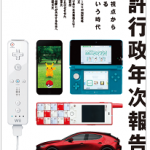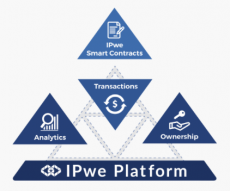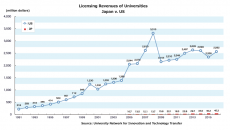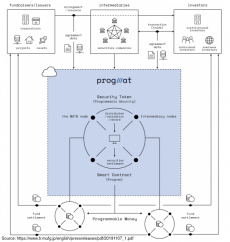
Japan’s Tokyo and Osaka district courts will start an intellectual property mediation service in October 2019. The Tokyo district court published the operational guidelines for the new service on August 1. The purpose of this service is to solve an IP dispute quickly through a discussion between both parties, by advice or opinion from a mediation committee which consists of three members – a judge in the IP division and two experts such IP attorneys. This mediation tries to draw a conclusion in 3 to 6 months (within three times mediation meetings). The mediation committee discloses impression of the case. But also it may suggest the parties to solve the dispute […]

Japan Patent Office (JPO) published an annual report on July 12 2019. According to the report, 313,567 patent applications were filed in Japan in 2018. And, 253,000 patent applications among them were filed by domestic applicants. It slightly decreased than last year. As you may know, Japanese companies have been reducing investment in Japanese patents. However, my more serious concern is that they have been not increasing investment in patenting in foreign countries either, while increasing foreign sales. The chart shows the transition of foreign patent filing number and the foreign sales of Japanese companies. In fact, Japanese companies have not increased investment in intellectual properties, despite the increasing importance of […]

JPO’s SEP advisory opinion service has been updated for cases received on or after July 1 2019. This service started from April 2018, to provide a JPO’s non-binding opinion on whether a particular patent is a standard essential patent (SEP). We covered this service in the previous article here. The changes in the user’s guide include the following. User can demand an opinion that a particular patent is NOT a standard essential patent. User can use this service not only for licensing negotiations, but also for the negotiations in patent trade, business transfer involving patent transfer, and creation of security interest in patents. It explicitly describes that, even when JPO provides a […]

We are delighted to announce the partnership with IPwe to introduce their unique patent transaction platform to Japan. IPwe created the first platform for the world’s patent ecosystem, connecting buyers and sellers of patents and patent-related services, creating a tradable asset. IPwe leverages the power of artificial intelligence (AI), data mining, predictive analytics and blockchain to unlock global patent value. Please contact us for more information.

Japanese large companies have been stealing SMEs’ intellectual property. This issue was brought up in a working group discussing the improvement of business conditions for SMEs or subcontracting companies, as reported in our previous article. Then, Japan Fair Trade Commission (JFTC) conducted surveys on the handling intellectual property in the transactions in manufacturing industry, and published the report on June 14 2019. JFTC had responses from 15,875 manufacturers, and received reports of 726 incidents. The reported incidents include: Forcing the disclosure of know-how, to manufacture in-house or make other cheaper companies manufacture the product using such know-how. Doing joint research only by name, in which only a subcontracting company works […]

On June 7 2019, Japan Intellectual Property High Court ruled standard for calculating damages, especially deductible expenses, in a patent infringement case on carbonated pack cosmetics. Below is the summary of the decision. 1. Presumed damages Japanese patent law provides provisions to make it easier for patent holders to prove the amount of damages. One is to regard “the amount of profit earned by the infringer” as the amount of damages of the patent holder (Article 102, paragraph 2). Profit earned by the infringer Here, the court ruled that “the amount of profit earned by the infringer” is the marginal profit which is calculated by deducting “the expense which is […]

Previously on this blog, we featured a story about a fight on patent royalty between a university researcher and a licensee company. And, it suggested a problem of a talent shortage for intellectual property in the university. Licensing Revenues of Japanese Universities When talking about licensing revenues of universities, Japanese universities are often compared with American universities. Then, Japanese universities’ low income is considered a problem. In fact, American universities earned USD 2,562 million in 2016, according to University Network for Innovation and Technology Transfer (UNITT). On the other hand, Japanese universities earned JPY 4.53 billion (about USD 41.2 million). There is a big gap between them. However, it is not simply […]








